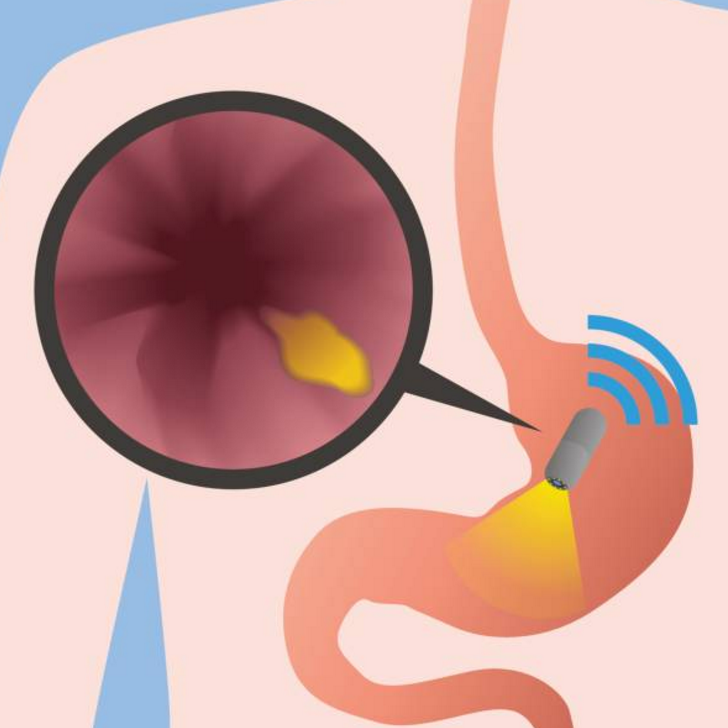General Information
Small Bowel Capsule Endoscopy or Pillcam is an important diagnostic tool that we use to check the small bowel for the presence of disease. This type of endoscopy is able to reach the parts of the small intestine that cannot be visualized during traditional Panendoscopy (Gastroscopy) or Colonoscopy. For the Pillcam procedure, patients are asked to swallow a capsule that contains a miniature camera. The camera within the capsule continuously captures images as it travels through the gastrointestinal tract before sending them wirelessly to a recorder that is worn around the waist. The capsule is usually passed out painlessly with the faeces within one to two days.
Small Bowel Capsule Endoscopy offers several advantages over traditional endoscopy procedures including it does not require sedation, is less likely to cause discomfort and has fewer potential complications.
Unfortunately some procedures such as specimen collection or taking a biopsy are not possible during a Small Bowel Capsule Endoscopy, meaning, that if medically indicated, further procedures may be necessary.
Indications
Small Bowel Capsule Endoscopy may be recommended by your doctor to investigate conditions such as:
- Crohn’s disease
- Coeliac disease
- Small bowel tumours
- Anemia of unexplained origin
Special Considerations
Before the procedure, please ensure staff are aware of all medications you are taking. You will also need to alert the gastroenterologist if you have swallowing difficulties, have a pacemaker fitted, have experienced bowel obstructions in the past or had previous abdominal surgery.
If you take iron supplements please stop these medications 7 days before your procedure date.
Sedation
Small Bowel Capsule Endoscopy does not require sedation or anaesthetic.
Preparation for your Small Bowel Capsule Endoscopy
An empty stomach allows optimal viewing conditions so patients are required to preparation the day before the procedure.
DAY PRIOR TO PROCEDURE:
- Please avoid foods with seeds but otherwise you may eat and drink as normal until 4pm the day before your procedure.
- Take all prescribed medications as per usual
- At 4pm you will need to prepare for the procedure by consuming a clear fluid diet and starting your bowel preparation. We recommend Moviprep as the bowel preparation prior to a Small Bowel Capsule Endoscopy. Moviprep can be purchased from any Chemist of from CDD without a script. The following link will take you to the Instructions for Taking Moviprep as an Out-Patient Information Booklet which contains important information on how to prepare for your procedure. Please follow the Morning Procedure directions on page 3 of the booklet: https://centrefordigestivediseases.com/wp-content/uploads/2018/07/English-amended.pdf
- Fast (nothing to eat or drink) from 12 midnight on the morning of your procedure.
DAY OF YOUR PROCEDURE:
- Ensure that you are wearing loose and comfortable three piece clothing
- You are able to go back to work after the device has been fitted. You are able to use a computer, mobile phone, a land line and a microwave oven. You can sit, lie down, and walk; walking is encouraged to keep the capsule moving through the gastrointestinal tract.
- After ingesting the capsule and until it is excreted, patients should not be in the vicinity of any device that generates strong magnetic fields (such as a Magnetic Resonance Imaging (MRI) machine) as this can cause problems with the metallic parts of the camera inside the capsule.
- Running, vigorous exercise and excessive bending are discouraged for the duration of the procedure as this may dislodge monitoring equipment.
- Eight hour after the device has been fitted you will need to return to the Centre for Digestive Diseases where your recorder will be removed. The results will be viewed by your doctor before being sent to you and the referring doctor.
Post Procedure Care
Please note the following important points after you have your procedures:
- The capsule progresses naturally through the gastrointestinal tract with the bowel movement and does not need to be collected from the stool after being passed.
- There should not be any pain or discomfort as the capsule passes. Should you feel sharp or persistent pain, please contact the Centre. See Contact Details section listed below.
- Nausea is very uncommon. Should you feel nauseated or begin vomiting, please contact the Centre. See Contact Details section listed below.
Unless otherwise instructed by your gastroenterologist, after your procedures:
- You can restart your normal diet and medications
- You can resume all normal activities including work and exercize
Until the capsule passes, further testing which includes any type of MRI should be avoided. If you have an MRI examination scheduled within the next 3 days, the MRI examination should be postponed.
Complications
Small Bowel Capsule Endoscopy is considered a safe procedure but in a small number of patients complications may occur.
Although low risk, it is possible that the capsule may get stuck in the gastrointestinal tract whilst transiting through the system. This risk is higher for patients who have conditions where narrowing or stricturing of the bowel occurs, such as in Crohn’s disease or where adhesions have formed following past abdominal surgery. It is important to inform the gastroenterologist if any signs of possible complications develop after the procedure. Symptoms such as fever and vomiting, trouble swallowing, increasing chest and abdominal pain should be reported.
If your gastroenterologist suspects that the capsule has not passed and you are having symptoms of concern, investigations such as abdominal x-ray may be required followed by procedures to remove the capsule if necessary. If you wish to discuss the potential risks or any issues regarding your procedure(s) in more detail, please speak with the gastroenterologist.
Contact Details
Please see the following link for CDD contact details during office hours, 9 – 5pm, Monday to Friday: https://centrefordigestivediseases.com/contact-us/. As the Centre is a Day Stay Unit only, if complications following procedure arise outside of business hours you should seek medical attention from either your GP or nearest hospital emergency department.

